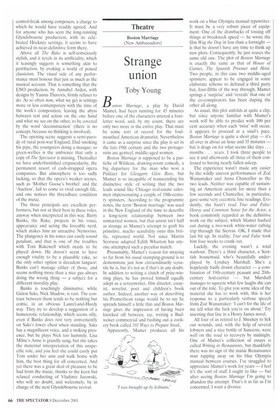Theatre
Boston Marriage (New Ambassadors)
Strange union
Toby Young
Boston Marriage, a play by David Mamet, had been running for 45 minutes before one of the characters uttered a fourletter word, and, by my count, there are only two more in the entire play. That must be some sort of record for the foulmouthed American dramatist. Nevertheless it came as a surprise since the play is set in the late-19th century and the two protagonists are genteel, middle-aged women.
Boston Marriage is supposed to be a pastiche of Wildean, drawing-room comedy, a big departure for the man who won a Pulitzer for Glengarry, Glen Ross, but Mamet is so incapable of transcending his distinctive style of writing that the two leads sound like Chicago real-estate salesmen impersonating a couple of 19th-century spinsters. According to the programme notes, the term 'Boston marriage' was used in the New England of the time to describe a long-term relationship between two unmarried women, but that union isn't half as strange as Mamet's attempt to graft his primitive, macho sensibility onto this brittle, repressed world. Not since Martin Scorsese adapted Edith Wharton has anyone attempted such a peculiar match.
Presumably, Mamet's reason for straying so far from his usual stamping-ground is to demonstrate just how extraordinarily versatile he is, but it's not as if that's in any doubt. In addition to writing a clutch of prize-winning plays, he has proved himself equally adept as a screenwriter, film director, essayist, novelist, poet and children's book author. Indeed, another way of describing his Promethean range would be to say he spreads himself a little thin and Boston Marriage gives the impression of having been knocked off between, say, writing a Budweiser commercial and bashing out a cookery book called 101 Ways to Prepare Steak.
Apparently, Mamet produces all his
work on a blue Olympia manual typewriter. It must be a very robust piece of equipment. One of the drawbacks of tossing off things at breakneck speed — he wrote the film Wag the Dog in less than a fortnight — is that he doesn't have any time to think up new plots. Consequently, he just reuses the same old one. The plot of Boston Marriage is exactly the same as that of House of Games, The Spanish Prisoner and Heist, Two people, in this case two middle-aged spinsters, appear to be engaged in some elaborate scheme to defraud a third party but, four-fifths of the way through, Mamet springs a 'surprise' and 'reveals' that one of the co-conspirators has been duping the other all along.
As usual, this plot unfolds at quite a clip, but since anyone familiar with Mainers work will be able to predict with 100 per cent accuracy when each 'twist' will occur, it appears to proceed at a snail's pace. Boston Marriage is quite a short play — it's all over in about an hour and 35 minutes — but it drags on for what seems like days... months . . years. I took three people to see it and afterwards all three of them confessed to having nearly fallen asleep.
The experience wasn't made any easier by the wildly uneven performances of Zoe Wanamaker and Anna Chancellor as the two leads. Neither was capable of sustaining an American accent for more than a few seconds and Chancellor, in particular, gave some very eccentric line readings. Evidently, she hasn't read True and False: Heresy and Common Sense for the Actor, a book commonly regarded as the definitive work on the subject, which Mamet bashed out during a two-week white-water rafting trip through the Sierras. OK, I made that last bit up. In reality, True and False took him four weeks to crank out.
Luckily, the evening wasn't a total washout. There's a third character, a Scottish housemaid, who's beautifully underplayed by Lyndsey Marshall, She's a hopelessly badly drawn character — a combination of 19th-century peasant and 20thcentury hod-carrier — but Marshall manages to squeeze what few laughs she can out of the role. To give you some idea of the material she has to work with, this is her response to a particularly verbose speech from Zoe Wanamaker: 'I can't for the life of me tell what the fuck you're on about.' Try inserting that line in a Henry James novel.
All four of us retired to J. Sheekey to lick our wounds, and, with the help of several lobsters and a nice bottle of Sancerre, were well on the road to recovery by midnight. One of Mamet's collection of essays is called Writing in Restaurants, but thankfully there was no sign of the manic Renaissance man tapping away on his blue Olympia manual between courses. I've struggled to appreciate Mamet's work for years — I feel it's the sort of stuff I ought to like — but after seeing Boston Marriage I'm going to abandon the attempt. That's it as far as I'm concerned. I want a divorce.






















































































 Previous page
Previous page